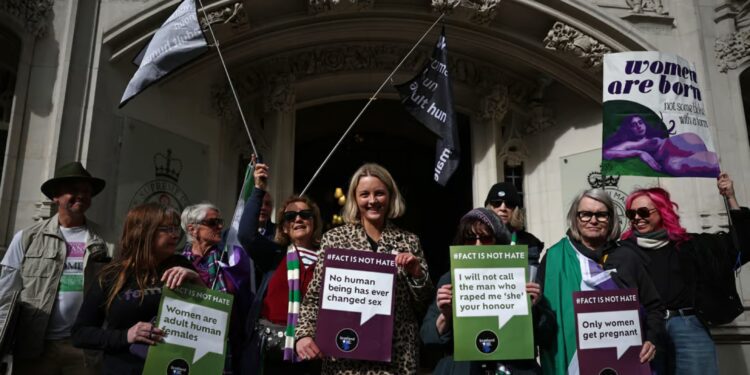The UK Supreme Court has ruled today, Wednesday 16 April 2025, that the legal definitions of “woman” and “sex” in the Equality Act 2010 refer exclusively to biological sex. The verdict settles a years-long legal battle brought by the campaign group For Women Scotland (FWS), challenging Scottish government guidance that included transgender women with gender recognition certificates (GRCs) under the Act’s protections for women.
The five justices—Lord Reed, Lord Hodge, Lord Lloyd-Jones, Lady Rose, and Lady Simler—were unanimous in their ruling.
Lord Hodge, delivering the judgement, cautioned, “We counsel against reading this judgement as a triumph of one or more groups in our society at the expense of another. It is not.”
Still, outside the Supreme Court, FWS campaigners cheered, hugged, and toasted with champagne. “Today the judges have said what we always believed to be the case, that women are protected by their biological sex,” said Susan Smith, co-founder of FWS. “Sex is real, and women can now feel safe that services and spaces designated for women are for women.”
Origins of the Dispute
The dispute stems from the Gender Representation on Public Boards (Scotland) Act 2018, which aims to increase female representation. FWS, however, objected to the law’s inclusion of trans women, arguing it unlawfully redefined “woman” beyond the scope of the Scottish Parliament’s authority.
After setbacks in lower courts—including a 2022 ruling by Lady Haldane that “sex” included legal sex as per GRCs—FWS appealed to the UK’s highest court.
The Scottish government had however, maintained that those with a GRC, legally recognising them as female under the 2004 Gender Recognition Act, should be included under the Equality Act’s protections for women. The Supreme Court disagreed.
‘Victory for Women’s Rights’
Trina Budge, director of FWS, hailed the ruling as a clear win. “It means there’s absolute clarity in law regarding what a woman is. We know for sure now that we are referring to the biological sex class of women,” she told Sky News. “When we see a women-only space, it means exactly that. Just women. No men. Not even if they have a gender recognition certificate.”
Campaign group Scottish Lesbians echoed that sentiment, saying the ruling “restores freedom of association to lesbians and allows us to exclude biological men from our groups, spaces and associations.”
UK Conservative Party leader Kemi Badenoch also called the ruling “a victory for all of the women who faced personal abuse or lost their jobs for stating the obvious.” She added, “Women are women and men are men: you cannot change your biological sex.”
Concerns from Trans Advocates
Trans rights groups reacted with alarm. Ellie Gomersall, a transgender woman and activist with the Scottish Greens, described the judgement as “yet another attack on the rights of trans people to live our lives in peace.”
Scottish Greens MSP Maggie Chapman added, “This is a deeply concerning ruling for human rights… Trans people just want to be able to live their lives like any of us, without the fear of prejudice or violence.”
Scottish Trans, a charity, urged calm and encouraged people “not to panic,” stressing that the impact of the decision may be overstated in the media.
‘Binary Concept of Sex’
The court’s 88-page judgement explicitly stated, “The concept of sex is binary; a person is either a woman or a man.” It rejected the notion that legal sex via a GRC should override biological reality in the application of the Equality Act.
Importantly, the ruling emphasised that transgender people remain protected under the Act’s provisions on gender reassignment. “Trans people are protected from discrimination… whether or not they possess a gender recognition certificate,” said Lord Hodge.
The judges reasoned that interpreting sex as “certificated sex” would result in “incoherent” and “odd” legal consequences, including unequal treatment between trans people with and without a GRC—distinctions that would be nearly impossible to enforce given the confidential nature of GRCs.
Implications for Single-Sex Spaces
The judgement reinforces the legality of single-sex services, such as domestic violence refuges, rape crisis centres, and hospital wards designated for women. “It is fanciful, even perverse, to think that any reasonable objection to the presence of a person of the opposite sex could be grounded in GRC status,” the court stated.
A UK government spokesperson welcomed the ruling, saying it “brings clarity and confidence for women and service providers such as hospitals, refuges, and sports clubs.”
Political Fallout in Scotland
The ruling marks a significant blow to the Scottish government, whose ministers had argued for a more inclusive interpretation of sex. Scottish Conservative MSP Russell Findlay described the judgement as “a victory for women and common sense” and urged First Minister John Swinney to “stop obsessing about gender and get back to the day job.”
“This ruling should sound the death knell once and for all for Nicola Sturgeon’s reckless self-ID plans,” he added.
Labour veteran Harriet Harman, who helped draft the Equality Act, said the ruling “protects the rights of women while also respecting the rights of trans women”, noting that exclusion from single-sex spaces should only occur “where necessary.”
The Scottish government has yet to issue an official response.
Back to the Political Arena
While the legal battle may be over, the political and social debate continues. BBC Scotland’s political correspondent Philip Sim observed: “This ruling goes beyond what For Women Scotland had hoped for. It is an unambiguous statement that sex-based rights are based on biological sex.”
Campaigners on both sides are preparing for renewed clashes in the political and public spheres now that the Supreme Court’s decision has become law.
As FWS’s Susan Smith put it, “There is going to be an ongoing fight. But now we have a really concrete basis for going forward.”



